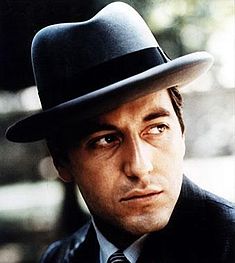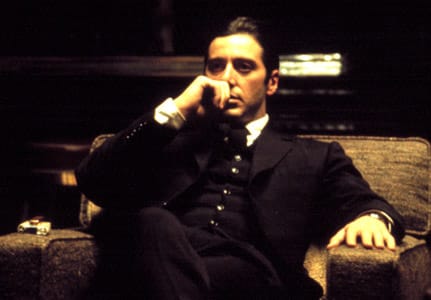The Italian mafia and all that it glorifies have been scrutinized through film since the beginning of the twentieth-century. The images that the masses have come to know and accept as the Italian mafia were created from the beginning stereotypes in Italy. Even before many Italians arrived in the United States, it was understood that in the old country there was a calculated system of families that thrived off organized crime. When they immigrated to America that stigma stuck to the Italian’s image.
In Francis Ford Coppola’s The Godfather, the stereotypes of wealth and violence help perpetuate many of the blatant images of the Italian  mafia. Throughout the film there are many obvious stereotypes. For one, there is the actual look of the gangster. The pin-striped suit, the expensive jewelry and the heavy Italian accent are all presented in the duration of the film. However these stereotypes did not originate from The Godfather, but from gangster films of the 20’s and 30’s like Scarface (1932). In these films the characters are very similar to those in The Godfather in the way they dress, speak and behave, but Francis Ford Coppola’s The Godfather is the epitome of all the stereotypes of the Italian mob.
mafia. Throughout the film there are many obvious stereotypes. For one, there is the actual look of the gangster. The pin-striped suit, the expensive jewelry and the heavy Italian accent are all presented in the duration of the film. However these stereotypes did not originate from The Godfather, but from gangster films of the 20’s and 30’s like Scarface (1932). In these films the characters are very similar to those in The Godfather in the way they dress, speak and behave, but Francis Ford Coppola’s The Godfather is the epitome of all the stereotypes of the Italian mob.
The protagonist of The Godfather is Michael Corleone (Al Pacino), a decorated war veteran with honor and principles who slowly finds himself descending into the mafia limelight after a coup against his father. In this film the stereotype of an Italian mobster creates the image and identity of Michael Corleone, which the public then finds believable. Michael’s conformity into the Italian mafia is caused by the pressures from both the corrupt outside world and the fast, gaudy lifestyle of his family. Jessica Hagedorn, a screenwriter and novelist writes in her essay “Asian Women in Film: No Luck, No Joy”: As I was growing up in the Philippines in the 1950’s, my fertile imagination was colonized by thoroughly American fantasies (355).
As how Hagedorn explains, Michael is a victim of the American dream ideology of the 1950’s. This theory of starting over and rising to the top of a capital empire helped and hurt many people during this time period. Michael, being a war hero, wanted to come home to a society of peace where everyone lived a very average, communal life. What he experienced when he arrived was something he did not expect. At one point in the wedding scene Don Corleone (Michael’s father and mob boss) confronts his son on why he is wearing a military uniform.
MICHAEL
I fought for my country. It was my choice.
DON CORLEONE
And now, what do you choose to do?
MICHAEL
I’m going to finish school
DON CORLEONE
Good. When you are finished, come and talk to me. I have hopes for you.
The Godfather is a film that questions the brutality of absolute power. Michael, who is pressured from everywhere by figures of heavy authority struggles to find his identity and finally confides in his family; the mafia. In the second half of the film the audience witnesses the dramatic transformation of Michael Corleone. After his father is attacked by a rival family, Michael decides to run the family business while his father recovers from the bloody diatribe. At this point Michael adopts many of the images that the masses associate with the Italian mafia. Since he is in a position of great power, Michael must act as though he is harsh and heartless. He starts wearing pin-stripped suits, a classy hat and even carries himself in a more-tough, adamant manner. All these changes he makes are to further reaffirm his corrupt colleagues in the government into believing Michael is confident enough to run the business. In actuality, the changes he makes only distance himself further from being accepted by society. In his essay “So You Wanna Be a Gangsta?” Todd Boyd, a professor at the University of Southern California’s film school states:
And though their desire, being heavily influenced by the discourse of an ‘American Dream,’ was to ultimately be fully assimilated into American society, the achievement of this desire was revealed to be at the cost of losing their ethnic and cultural heritage (345).
Ultimately, the pressure from the outside world against Michael Corleone forces him into a dissident lifestyle; thus creating the image of a “gangster” persona. In a scene where Don Corleone is lying on his deathbed, he talks to Michael about what he has become.
MICHAEL
Then why have I become a man like you?
DON CORLEONE
You are like me, we refuse to be fools, to be puppets dancing on a string pulled by other men. I hoped the time for guns and killing and massacres was over. That was my misfortune. That was your misfortune. I was hunted on the streets of Corleone when I was twelve years old because of who my father was. I had no choice.
At this point, Michael understands his personality change into what his father knew what would happen a long time ago. Don Corleone saw himself within Michael and knew that one day Michael would be the next Don.
Throughout the film many stereotypes of family, traditions and violence arise. Besides the many stereotypes, there are many overt images of Italian mobsters in the film. With all of this said, do the stereotypes of the brutal underworld and the gaudy images of themselves accurately portray the Italian-American mafia in The Godfather?
The full descent into the Italian ethnicity is evident in The Godfather. Todd Boyd, on The Godfather writes:
It is Francis Ford Coppola’s argument that such oppression forced these Italian immigrants into a subversive lifestyle and economy….Borrowing from their own cultural tradition, some of these new Americans used the underground economy as a vital means of sustenance in the face of ethnic, religious, and cultural oppression (345).
The level of detail Coppola creates in this film allows the old stereotypes of Italians to regenerate and foster stereotypical images of themselves  as hard-fisted, greased up gangsters. With these constant images throughout the film, Michael lies in the center being the epitome of the stereotype creating the image. Before he was involved with the family, he thought, dressed, and acted differently; but now that he has fully immersed himself into the mafia he carries along the image of an Italian gangster, just like the rest of his family. When Michael goes to Las Vegas to meet with his older brother Fredo about the gambling business, he says one simple line that fully explains his own transformation:
as hard-fisted, greased up gangsters. With these constant images throughout the film, Michael lies in the center being the epitome of the stereotype creating the image. Before he was involved with the family, he thought, dressed, and acted differently; but now that he has fully immersed himself into the mafia he carries along the image of an Italian gangster, just like the rest of his family. When Michael goes to Las Vegas to meet with his older brother Fredo about the gambling business, he says one simple line that fully explains his own transformation:
FREDO
Mike, you sure about Moe selling. He never mentioned it to me and he loves the business.
MICHAEL
I’ll make him an offer he can’t refuse.
Before those words were only used by his father (which meant his father would threaten their clients life until they agreed), but now they are used by Michael indicating that he is using the methods his father used. That simple line is very ironic because when Michael returned home from the war he swore he would never be like his father, but here he is in Las Vegas using the words his father used many times in matters of business.
When many people watch gangster films like The Godfather they are witnessing what may be their only base of judgment of the Italian mafia. In all honesty, not that many people know or have met a mafia member, so their image of an Italian mobster is purely generated by Hollywood filmmakers. When the masses watch these films they are witnessing the image and the stereotype being created right before them. In the common viewers eye a gangster is someone who dresses in suits, acts violently and talks with an uneducated accent; but in actuality many of these images and stereotypes may not be true. In order for the public to understand this Italian subculture, the filmmakers have to make generalizations and from these generalizations come the image and the stereotype. These depictions of how the mafia took actions into their own hands may be similar to how the actual mafia behaves, but a lot of the brutal actions found in The Godfather could definitely be exaggerated; and from these bluffs comes the imprinted vision of image and stereotype. The character of Michael Corleone is so vital to the core of this film, but not only for the storyline, but for him to be an example how the stereotype of his own people transformed him into the image of what we have all come to accept as the Italian mafia.
